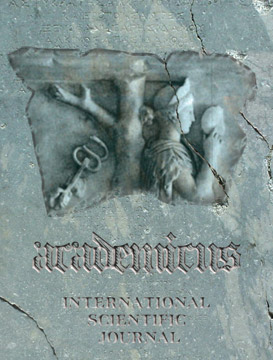Title:
Author(s):
Abstract:
The migrant crisis is an imposed problem that requires a thorough solution. The complete understanding of the reasons for migration, as well as the situation in the Mediterranean basin and in the Middle East is a precondition for finding appropriate solutions. Eradication of poverty and disparity, the fight against terrorism and the ISIS extremism as well as the fight against other similar groups are just a fraction of the necessary preconditions for a successful dealing with the current challenges. The solution to the drama with the infinite wave of migrants from Syria and the Middle East, to which we are sad observers, seems is not to be seen soon. First of all, if we look at the European political elite and the general lack of a reliable and clear strategy for solving this problem, all we will see is helplessness and mutual accusations. The migrant or the refugee crisis is followed by a large number of incidents or series of events. The massive arrival of refugees in the European Union, usually illegal migrants from Asia, Africa and parts of Southeastern Europe, started in the mid of 2010 and escalated in 2015. The reasons for the mass arrival are traditionally associated with the chronic unemployment and poverty in these countries, but lately, are also result of the war, especially in Syria, where the civil war caused massive exodus of the population. The situation is similar in Libya, where the fall of Moamer Gaddafi’s regime led to anarchy, used by the well-organized networks of human traffickers. By mid-2015, the refugee crisis mainly took place on the Mediterranean coast of Italy, where refugees were arriving by ships and boats. In many cases, such attempts were futile and led to mass deaths. Lately, there has been a massive influx of refugees and migrants in the Balkans, using Greece and Croatia, EU member countries on the periphery of the Union, as entry point. But also, The Republic of Macedonia and the Republic of Serbia, candidate countries for the EU, are not bypassed. Although the European political establishment met the refugees with sympathy and as victims of the horrors of war that EU needs to provide shelter for, in time, the attitude toward the refugees became subject to fierce criticism by part of the European public. Concerns about the additional burdening of the social services, worsening of the security situation or the possible disappearance of the Christian identity of Europe due to the massive influx of Muslims from war areas in the Middle East arose. Recently, the attitude toward the migrants became the subject of a heated debate - dispute between some European countries, especially between Germany, which insists on “open door” policy and Hungary, Slovakia and Poland, which claim that their countries will suffer consequences due to such policy. The refugee-migrant crisis is a threat in several aspects and already has influence on the economic and social stability as well as internal security in the countries through which the migrants transit or remain, including the Republic of Macedonia. The busiest western – Balkan route used for arrival in the Schengen zone, especially in Germany, Sweden and other western and Nordic countries, brings negative influence visible in the social aspect, genuine threat to the national identity (culture, language, religion) and such endangerment inevitably will lead to an increased incidence of xenophobia, nationalism and racism. At the end, conditions for emergence of social disintegration will be created in the countries through which the migrants transit or remain, including the Republic of Macedonia. The economic stability, being crucial for a social stability, but also, for internal security, will be affected due to the use of additional resources and capacities (accommodation, health, communal services, transport and education) that the affected countries, including the Republic of Macedonia, should provide and set in function due to the newly arisen situation.
Keywords:
migrants; refugees; challenge; security; stability
Full Text PDF:
References:
View complete reference list, click
here
Digital Object Identifier DOI:
The article's content ©Academicus™ Migrant Crisis, a Security Challenge for the Republic of Macedonia
by
Prof.As.Dr. Muhamet Racaj
is licensed under a Creative Commons
Attribution-NonCommercial 4.0 International License.
Presented:
April 2016
Included for Publishing:
June 2016
Published:
July 2016,
Volume 7,
Issue 14
Academicus International Scientific Journal is an Open Access Journal. This means that all content is freely available without charge to the user or his/her institution. Users are allowed to read, download, print, search, or link to the full texts of the articles in this journal without asking prior permission from the publisher or the author. This is in accordance with the BOAI definition of open access. Users are obliged to cite the source (Academicus International Scientific Journal) and the author, according to the international citation standards.
To learn more about the OA Policy followed by Academicus ISJ, read Journal Regulations
Academicus
International Scientific Journal
pISSN 2079-3715
eISSN 2309-1088
Address:
Sheshi i Flamurit, Rruga Muze
Al-9401 Vlorë, Albania
Tel: +355 68 60 60 555
info@academicus.edu.al
https://academicus.edu.al



 Scholar
Scholar
 Crossref
Crossref
